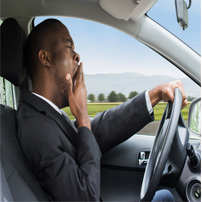Drowsy Driving
March 24, 2018 Previous estimates on how many fatal car accidents are related to drowsy driving are far lower than previously reported, according to the Centers for Disease Control and Prevention (CDC). Although it might not seem like such a big deal to get behind the wheel when feeling fatigued, the reality is that it puts everyone on the road at risk for catastrophic accidents, injuries and death.
Previous estimates on how many fatal car accidents are related to drowsy driving are far lower than previously reported, according to the Centers for Disease Control and Prevention (CDC). Although it might not seem like such a big deal to get behind the wheel when feeling fatigued, the reality is that it puts everyone on the road at risk for catastrophic accidents, injuries and death.
In 2013, the National Highway Traffic Safety Administration (NHTSA) estimated that drowsy driving was responsible for roughly 800 deaths annually. However, according to up-to-date CDC data, that number is much closer to 6,000. This means that drowsy driving is a more large-scale, serious and deadly public health threat than many may have previously suspected.
In a CDC survey of nearly 150,000 drivers, 4% said they had fallen asleep behind the wheel at least one time in the last 30 days alone. To put it a different way: that means that for every 25 drivers on the road, at least 1 is asleep. Other comprehensive surveys have turned up equally concerning results. Here are a few examples from the National Sleep Foundation (NSF):
- More than one-third of drivers – which equals roughly 103 million Americans – said they have fallen asleep or “nodded” off behind the wheel in the last year;
- Sleep deprivation can result in impairments similar to alcohol; if a person has been awake for 18 hours it’s comparable to a BAC (blood alcohol level) of .05 (a person is legally drunk with a BAC of .08);
- Adults between 18 and 29-years-old are the most likely age group to drive while drowsy, and:
- Individuals who sleep 6-7 hours a night are up to two-times as likely to be in a drowsy driving-related crash than individuals who sleep 8 hours or more
Even though drowsy driving can be as dangerous – and deadly – as driving drunk, it’s not targeted in the same way. Obviously, there are no “sleepiness” tests to determine whether or not a driver is too fatigued to be safely operating a motor vehicle. The only real ways to make an impact on drowsy driving-related fatal accidents is to increase accountability and awareness so that people understand the dangers it creates for both themselves and others.
According to the Association for Safe International Road Travel (ASIRT), there are over 37,000 motor vehicle-related fatalities in the United States annually. On top of that, over 2.2 million others are injured or permanently disabled. With so many causes behind car accidents that are actually preventable, these numbers are far too high. We all need to commit to preventing drowsy driving, distracted driving and driving under the influence of drugs and/or alcohol – and local and federal agencies should continue to improve educational campaigns to save lives.
Drowsy driving isn’t just dangerous for the most obvious reason: that a person may actually fall asleep behind the wheel, but also for other reasons. The NSF reports that drowsy drivers are more likely to drive faster or speed, as well as to become irritable, impatient or stressed while driving. Everyone has had a bad night of sleep here or there, but it’s important to be able to recognize the signs of drowsy driving. The CDC reports that some warning signs to look out for include:
- Drifting from your lane;
- Struggling to remember the last few miles driven;
- Yawning – or blinking – frequently;
- Hitting a “rumble strip” on the side of the road, and:
- Missing an exit
If you’re driving and you feel drowsy, the best – and safest – thing you can do is pull over, change drivers (if possible) or rest. It is never worth risking your life, as well as the lives of all other drivers and passengers on the road, simply to get somewhere more quickly or because you’re not “too tired”. And even though someone may not mean to fall asleep behind the wheel there can be serious legal, physical, emotional and psychological consequences for drivers – and victims – who are involved in these kinds of accidents.
If you were injured in a motor vehicle accident because of a drowsy driver and you have legal questions, feel free to contact a representative at our firm who may be able to help.
Philadelphia Car Accident Lawyers at Galfand Berger, LLP Represent Car Accident Victims
If you were injured in a car accident, please contact the Philadelphia car accident lawyers at Galfand Berger. With offices located in Philadelphia, Bethlehem, Lancaster, and Reading, we serve clients throughout Pennsylvania and New Jersey. To schedule a consultation, call us at 800-222-8792 or complete our online contact form.
 Google Screened
Google Screened
